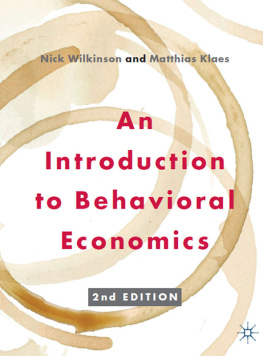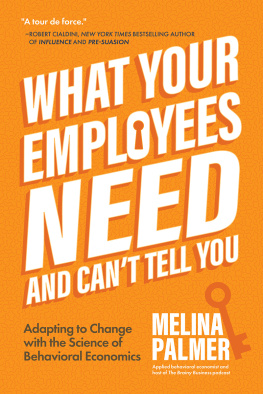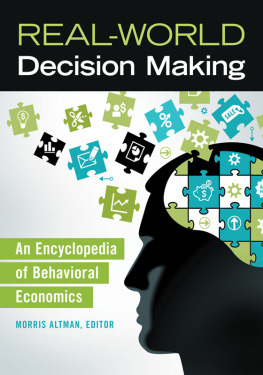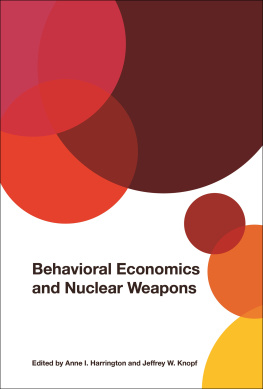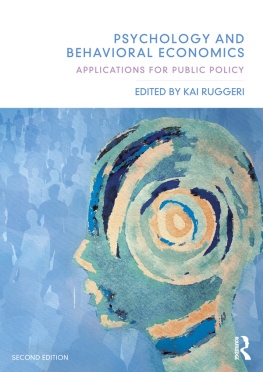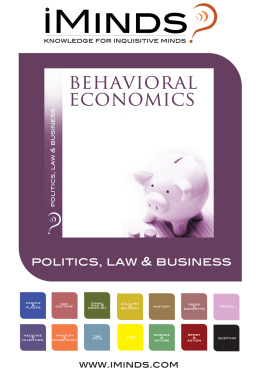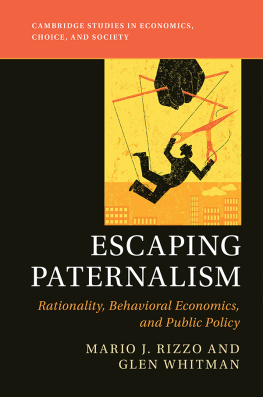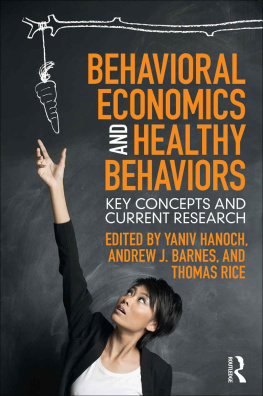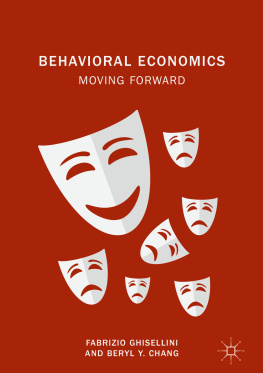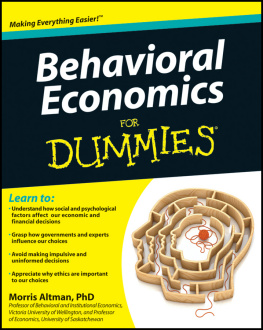Nick Wilkinson and Matthias Klaes
An Introduction to Behavioral Economics
2nd EDITION


Nick Wilkinson & Matthias Klaes 2012
All rights reserved. No reproduction, copy or transmission of this publication may be made without written permission.
No portion of this publication may be reproduced, copied or transmitted save with written permission or in accordance with the provisions of the Copyright, Designs and Patents Act 1988, or under the terms of any licence permitting limited copying issued by the Copyright Licensing Agency, Saffron House, 6-10 Kirby Street, London EC1N 8TS.
Any person who does any unauthorized act in relation to this publication may be liable to criminal prosecution and civil claims for damages.
The authors have asserted their rights to be identified as the authors of this work in accordance with the Copyright, Designs and Patents Act 1988.
First published 2012 by
PALGRAVE MACMILLAN
Palgrave Macmillan in the UK is an imprint of Macmillan Publishers Limited, registered in England, company number 785998, of Houndmills, Basingstoke, Hampshire RG21 6XS.
Palgrave Macmillan in the US is a division of St Martins Press LLC, 175 Fifth Avenue, New York, NY 10010.
Palgrave Macmillan is the global academic imprint of the above companies and has companies and representatives throughout the world.
Palgrave and Macmillan are registered trademarks in the United States, the United Kingdom, Europe and other countries
ISBN-13: 978-0-230-29146-1
This book is printed on paper suitable for recycling and made from fully managed and sustained forest sources. Logging, pulping and manufacturing processes are expected to conform to the environmental regulations of the country of origin.
A catalogue record for this book is available from the British Library.
A catalog record for this book is available from the Library of Congress.
Printed and bound in China
Brief Contents
List of Figures
List of Tables
Preface
The first edition of this book started out by saying that there should not really need to be a book entitled Behavioral Economics. The same still applies some four years later. All economics is behavioral in the sense of examining how people choose to act and allocate resources in different types of situation. However, over the last three decades the standard model of economic rationality, based largely on the assumption of expected utility maximization, has come under increasing criticism from both outside and inside the economics profession. The recent global financial crisis has exacerbated this situation. There are a large number of empirical anomalies that the standard model fails to explain.
Behavioral economics attempts to answer many of these criticisms by taking a broader approach to studying economic phenomena. It is behavioral in the sense that it combines the approaches of all the behavioral sciences, in particular economics, psychology, sociology and biology. This is currently not easy to do, since these different disciplines have traditionally adopted different and in many ways conflicting approaches. It is the essential philosophy of this book that economics is at its best when it takes a cross-disciplinary approach.
Yet, in spite of building criticisms and the considerable interest and debate in the profession, there are still hardly any current texts available on behavioral economics. There are books on behavioral aspects of other disciplines, such as marketing, finance, and even managerial accounting; there are collections of papers on behavioral economics; and there are books on particular aspects of behavioral economics, such as behavioral game theory. Thus there appears to be both high demand and low supply for a text in this area.
Many undergraduate students are now starting to study aspects of behavioral economics. The book is particularly appropriate for students in the third or fourth years of undergraduate study, or in a postgraduate program, once they have become familiar with the standard economics curriculum, its assumptions and methods, and to some extent its limitations. For postgraduate students in particular the text should serve as a foundation of linked themes and materials, providing a jumping-off point for further reading of the original papers on which the book is based.
The objectives of the text remain the same as with the first edition:
Present the principles and methods of behavioral economics in a logical and amenable manner, contrasting them with those of standard models.
Illustrate how behavioral approaches have begun to supplement standard models and in many contexts offer superior explanations and predictions, using a wide variety of empirical examples from both observational and experimental studies.
Provide a critical examination of the rapidly growing literature in behavioral economics.
Explain the policy implications of behavioral approaches, particularly when these differ from those of standard economics.
Provide a coherent psychological and social scientific framework underpinning the findings of behavioral economics.
Indicate the current trajectory of the subject, in terms of future challenges and areas meriting further research.
It should not be inferred from this that there is a single behavioral model that has universal acceptance. Within particular areas, like intertemporal choice and social preferences, there is often a profusion of models. Indeed, one main criticism of behavioral economics has been that there is an excessive number of different models, many of which may apply in a given situation. However, this issue arises in different guises with standard approaches as well, notably in the context of solution concepts in game theory, or more generally in response to ad hoc model specifications in applied areas such as industrial organization or the theory of the firm. Economics has a common analytical language but it has certainly moved away from grand unifying frameworks of analysis that general equilibrium theory once promised to offer.
As stated above, the central theme of the book is that it is intended to be highly cross-disciplinary in nature. Any book on behavioral aspects must of course involve psychology, but it is important to consider other areas too, notably evolutionary psychology and neuroscience, social psychology and sociology.
Many economists and psychologists reject the theories of evolutionary psychology as being largely speculative. They are frequently dismissed in the social sciences as being just-so stories, meaning that they are not true scientific theories in terms of proposing testable hypotheses. This view is caused by two main factors: (1) it is impossible by definition to perform experiments on the past; and (2) the past record of facts is highly incomplete. But on closer inspection there is considerable evidence in support of key tenets of evolutionary psychology. Furthermore, the tendency of many economists to limit explanations to economic phenomena is even more unsatisfactory as far as just-so stories are concerned. For example, many readers would not be satisfied with the explanations that people tend to succumb to temptation because they have short time horizons in decision-making, and that they make bad decisions when they are angry. These can also be regarded as just-so stories because they both beg the questions regarding why people have short time horizons, and why we have seemingly harmful emotional responses like anger.
Next page
